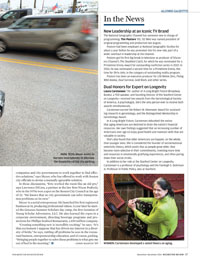Alumni Gazette
The National Geographic Channel has someone new in charge of programming: Tim Pastore ’00, ’02 (MA) was named president of original programming and production last August.
Pastore had been employed at National Geographic Studios for about a year before he was promoted into his new role, part of a wider overhaul in leadership at the channel.
Pastore got his first big break in television as producer of Discovery Channel’s The Deadliest Catch, for which he was nominated for a Primetime Emmy Award for outstanding nonfiction series in 2007. In 2010, he was nominated a second time for a Primetime Emmy, this time for Dirty Jobs, in the category of outstanding reality program.
Pastore has been an executive producer for Life Below Zero, Flying Wild Alaska, Dual Survival, Gold Rush, and other series.
 WINNER: Carstensen developed a noted theory on aging. (Photo: Fred Mertz for Rochester Review)
WINNER: Carstensen developed a noted theory on aging. (Photo: Fred Mertz for Rochester Review)Dual Honors for Expert on Longevity
Laura Carstensen ’78—author of A Long Bright Future (Broadway Books), a TED speaker, and founding director of the Stanford Center on Longevity—received two awards from the Gerontological Society of America. A psychologist, she’s the only person ever to receive both awards simultaneously.
Carstensen earned the Robert W. Kleemeier Award for outstanding research in gerontology, and the Distinguished Mentorship in Gerontology Award. In A Long Bright Future, Carstensen debunked the notion that aging Americans are destined to drain the nation’s financial resources. Her own findings suggested that an increasing number of Americans over age 65 enjoy good health and maintain skills that are valuable to society. She’s also found that older Americans are happier, on the whole, than younger ones. She is considered the founder of socioemotional selectivity theory, which posits that as people grow older, they become more selective in their commitments, investing more time and resources in emotionally gratifying experiences, and often paring down their social circles.
In addition to her role at the Stanford Center on Longevity, Carstensen is a professor of psychology and the Fairleigh S. Dickinson Jr. Professor in Public Policy, also at Stanford.

